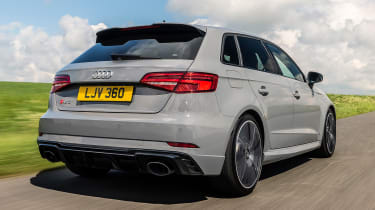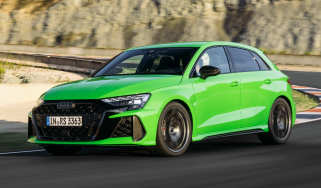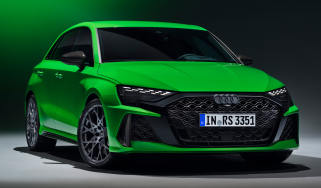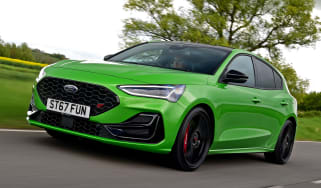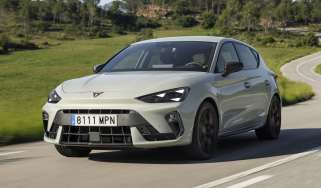Audi RS3 - Engines, drive & performance (2017-2021)
The RS3 is an incredibly quick car thanks to its 395bhp and quattro four-wheel drive
Audi’s quattro four-wheel-drive system is fitted as standard and it generates reassuringly high levels of grip in corners. The RS3 never suffers from excessive body lean in corners and stops just as impressively as it accelerates – while the fiercely expensive optional carbon-ceramic brakes provide even more dramatic stopping power.
Drivers will be hard-pressed to tell the difference between the Sportback and Saloon in terms of feel – both are very sharp and responsive. However, the separate boot and reduced interior volume of the Saloon mean it’s quieter inside and a little more mature-feeling on the road.
Audi’s sporty models are often criticised for being a little unrewarding from a driver’s perspective, but the steering has good weight and feels accurate. It’s likely that demanding drivers will prefer the BMW M2 Competition to the RS3 in terms of sheer thrills, but with its tenacious roadholding and the sheer grunt from its engine, the Audi is likely to prove the quicker car from one end of a B-road to another, particularly in poor weather.
Audi RS3 petrol engine
The RS3 boasts 395bhp from its turbocharged 2.5-litre petrol engine – an increase of 33bhp over the previous model. That was previously enough to trump the Mercedes-AMG A45 by 20bhp, but the latest A45 S has turned the tables with 415bhp and a 3.9-second 0-62mph time.
Due to upgraded materials for certain parts of the engine, the RS3 now weighs 26kg less than it used to. The lower weight means the car pulls even harder from low revs, and the seven-speed dual-clutch gearbox manages to be both quick-shifting and smooth.
Which Is Best?
Cheapest
- NameRS 3 TFSI Quattro 5dr S Tronic
- Gearbox typeSemi-auto
- RRP£60,195
Most Economical
- NameRS 3 TFSI Quattro 5dr S Tronic
- Gearbox typeSemi-auto
- RRP£60,195
Fastest
- NameRS 3 TFSI Quattro 5dr S Tronic
- Gearbox typeSemi-auto
- RRP£60,195

